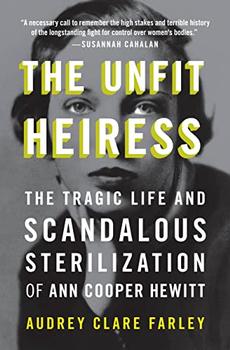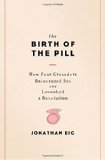Summary | Excerpt | Reviews | Beyond the book | Read-Alikes | Genres & Themes | Author Bio

The Secret History of Forced Sterilization and America's Quest for Racial Purity
by Harry BruiniusFrom the book
jacket: In Better for All the
World, Harry Bruinius charts the
little-known history of eugenics in
America—a movement that began in the
early twentieth century and resulted in
the forced sterilization of more than
65,000 Americans right up into the
1970s.
Comment: In 1927 the
Supreme Court upheld Virginia's right to
forcibly sterilize "feeble-minded
individuals" in Buck v. Bell.
Speaking for the majority, Judge Oliver
Wendell Holmes made the following statement: "It is better for all the world, if
instead of waiting to execute degenerate
offspring for crime, or to let them
starve for their imbecility, society can
prevent those who are manifestly unfit
from continuing their kind ... Three
generations of imbeciles are enough."
Taking Holmes's words for his title,
journalist Harry Bruinius draws on
personal letters, diaries, and documents
to bring us the lives of the three
scientists who developed the theories
and practices of eugenics: Francis
Galton who, inspired by his cousin
Charles Darwin, introduced
the idea of intelligence as an inherited
trait, and coined the
word "eugenics" (derived from
eugenes, Greek for "well born" or
"good breeding");
Charles Davenport, the first influential
eugenic thinker in America, professor at
Harvard University and the University of
Chicago, direct descendant of Reverend
John Davenport, the founder of the city
of New Haven; and Harry Laughlin,
Davenport's protégé, the nation's
foremost expert in eugenic sterilization
and also a leader in the movement to
stop the tide of immigrants coming to
this country.
Bruinius's account, enlivened with many
novelistic touches, is backed up by
well-documented hard data, including the
legislative records that show how 30
states implemented forced sterilization
programs; and how many individuals and
groups including Theodore Roosevelt, Woodrow Wilson, Margaret Sanger,
Alexander Graham Bell, the Carnegie and
Rockefeller foundations, Ivy League
scholars, temperance advocates,
suffragists, and liberal American
churches and synagogues all got behind
the campaign, inspired by the idea that
America could be a place where moral
purity and social harmony reigned.
America wasn't the only country to be
caught up in the eugenics movement.
The idea was born in England where, apparently, Winston Churchill and George Bernard
Shaw were both proponents, but
flourished in the USA; and Nazi
Germany's eugenics laws were inspired
and modeled on California's 1909
sterilization law.
Despite the title's claim to be telling
a "secret history" there are actually a
substantial number of books already
written about the American eugenics
movement, but most have been written
with the academic market in mind, not
the general public. The title that reviewers expert in the field most reference is Daniel
Kevles's In the Name of Eugenics.
In the realm of popular history,
there was also a 1994 television drama:
Against Her Will: The Carrie Buck
Story.
If there is a weakness in Bruinius's retelling it is that he focuses on the individuals' stories at the expense of exploring the issues that drove their often honorable intentions. Also, he does touch on modern-day issues such as genetic engineering (arguably the modern day equivalent of eugenics) but more exploration of the gray areas of eugenics past and present would have been appreciated. For example, no doubt we can all agree that mass genocide, however it might be practiced, is not a good thing; but at the other end of the scale, is a program such as Project Prevention (see sidebar), which some label as eugenics, entirely repugnant either?
![]() This review was originally published in The BookBrowse Review in February 2006, and has been updated for the
April 2007 edition.
Click here to go to this issue.
This review was originally published in The BookBrowse Review in February 2006, and has been updated for the
April 2007 edition.
Click here to go to this issue.

If you liked Better for All the World, try these:

by Audrey Farley
Published 2023
For readers of The Immortal Life of Henrietta Lacks and The Phantom of Fifth Avenue, a page-turning drama of fortunes, eugenics and women's reproductive rights framed by the sordid court battle between Ann Cooper Hewitt and her socialite mother.

by Jonathan Eig
Published 2014
The fascinating story of one of the most important scientific discoveries of the twentieth century.
Your guide toexceptional books
BookBrowse seeks out and recommends the best in contemporary fiction and nonfiction—books that not only engage and entertain but also deepen our understanding of ourselves and the world around us.